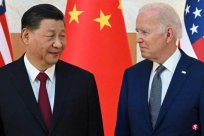
Paul Haenle, the honorary director of Morris Greenberg, China, believes that as Chinese Foreign Minister Wang Yi has determined to visit the United States, the next month's Xiwai will believe that it can be held as scheduled.He said that although the United States will not make concessions at a worship meeting, the leaders of the two countries can create a more positive and constructive opportunity for China and the United States.
Han Lei accepted an exclusive interview with Lianhe Morning Post before participating in the Huiyan China Global Forum on October 27 and put forward the above views.Han Lei served as the US government during his tenure in former US President Bush and Obama, and served as the Chinese Affairs Director of the National Security Council from 2007 to 2009.
Wang Yi visited the United States for three days from Thursday (October 26). During this period, he will meet with US Secretary of State Broskens and US National Security Counsel Shalvin to discuss a series of bilateral, regional and global issues.
Han Lei believes that Wang Yi visited the United States this week to attend the Asia -Pacific Economic Organization (APEC) Summit for the next month and prepare to meet with the US President Biden.
If you meet again after the Sino -US leaders have been re -meeting after nearly a year, Han Lei admits that this will help Sino -US relations that improved in a state of opposition, but it will not solve all problems between the two countries.The United States relations are sent to a more positive development track, and China and the United States will still face increasingly fierce strategic competition.
However, Han Lei believes that the leaders of the two countries sit face face to face, and still provide a mechanism that makes China -US interaction turn to more positive and constructive opportunities, and is expected to restore the relationship between the relationship between the two countries.
Bynden and Chinese officials met in Bali, Indonesia last November. Senior officials of the two countries talked in Langfang, Hebei every other month, and negotiated on promoting the guidance principles of Sino -US relations and agreed to manage competition responsible.
But Sino -US relations turned cold after the "balloon incident" occurred in February this year.Although high -level communication between the two countries has resumed since June, as the United States announced the latest rounds of artificial intelligence chip export control measures this month, the outside world still speculates whether Xiwai will achieve.
Han Lei researched and judged that this Xi -worship will talk about scientific and technological competition, but the United States will not make concessions, nor does it expect China to make a huge concession.
But he believes that Biden will clarify the current strategy of the "small courtyard", that is, the US government is working very hard to export restrictions on China, concentrated in specific technology fields, such as semiconductors, artificial intelligence and quantum quantumcalculate.
Han Lei quoted the statement of the US Minister of Commerce Raymond Doro that most trade between China and the United States has nothing to do with national security, and 99%of trade has nothing to do with export control."Both parties should realize that outside the small wall of the small courtyard, there is still huge space to cooperate."
China and the United States are difficult to reach cooperation in Harbin conflict
Brinken said at the United Nations Security Council on Tuesday (24th) that he will cooperate with Wang Yi, who is about to visit to the United States to prevent conflicts from spreading.
Han Lei said in an interview with China and the United States on the Harbin issue that the two countries did not think that China and the United States had a lot of room for cooperation, but did not think that it would damage Sino -US relations.Essence
Under the mediation of China, Saudi Arabia and Iran announced in March this year that they agreed to restore diplomatic relations, showing that China was more attempt to participate in global governance.
In this regard, Han Lei said that China and the United States are not tit -for -tat in every issue of global governance. Both countries hope to be peaceful and stable and economic growth, as well as to alleviate cross -border issues such as climate change and epidemic diseases. "The challenge lies inHow to implement these major principles into specific actions, rules and specifications that the two parties comply with. "




